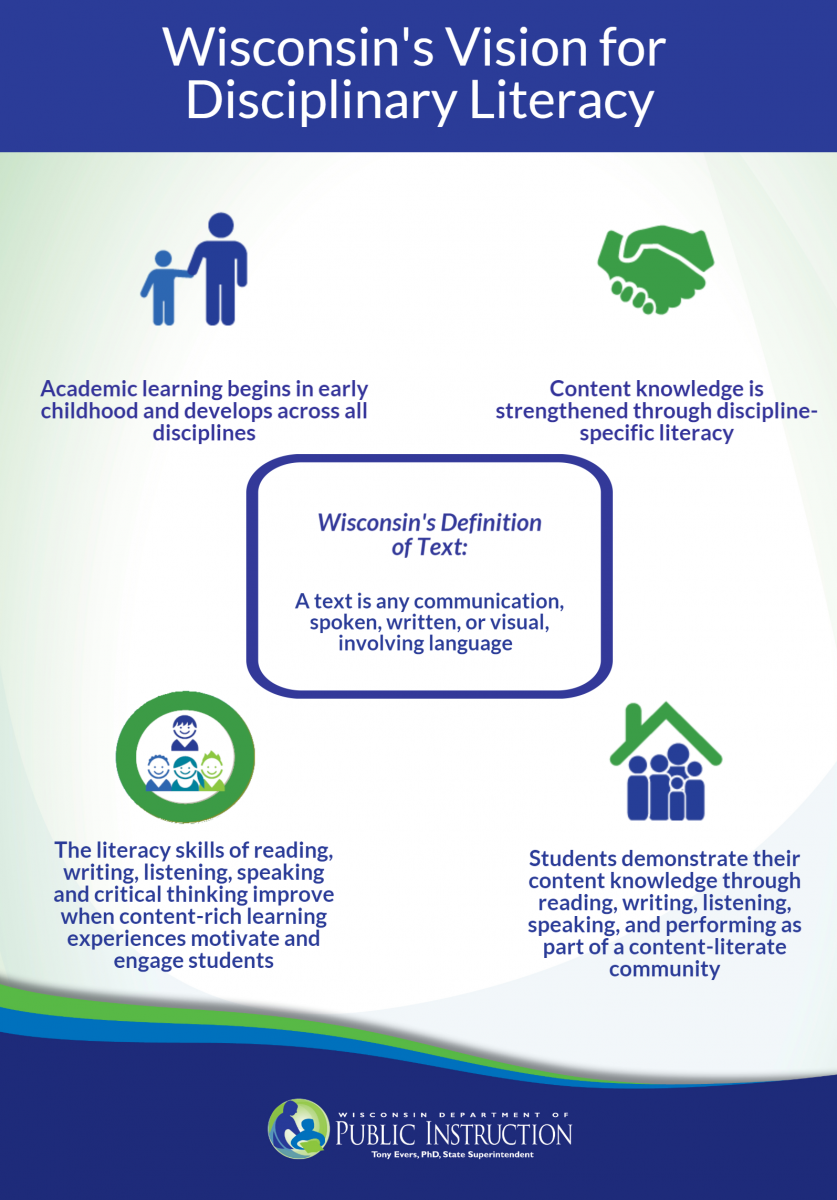Wisconsin's Definition of Disciplinary Literacy

In Wisconsin, disciplinary literacy (DL) is defined as the confluence of content knowledge, experiences, and skills merged with the ability to read, write, listen, speak, think critically and perform in a way that is meaningful within the context of a given field. For more information on the standards, please review the document on Literacy in all Subjects or the DPI Literacy in all Subjects webpage.
What does this mean?
- Disciplinary literacy requires the educator to take the content and context into account when choosing literacy techniques. For science, this may mean teaching a student how to write up a lab report, but that is not very helpful in social studies.
- Each subject area has a language and point of view all their own; students read and write differently in different subjects.
- For students to learn specialized vocabulary, it is important for it to be in context. DL also provides students background information for vocabulary that may have different meaning in different subject areas.
It means that we use literacy to help students understand our content, not that we use content time to teach basic literacy skills.
General DL information and handouts
General DL curated pins on Pinterest
Disciplinary Literacy is NOT the New Name for Content Area Reading. Blog post from Timothy Shanahan, Shanahan on Literacy, January 12, 2012.
A Disciplinary Literacy Bibliography. Blog post from Timothy Shanahan, Shanahan on Literacy, June 7, 2015.
Disciplinary Literacy: The Basics. Blog post from Timothy Shanahan, Shanahan on Literacy, March 15, 2017.
Disciplinary Literacy in Social Studies
Disciplinary literacy (DL) in social studies means that teachers are using thoughtfully chosen literacy techniques to teach students social studies objectives (not using social studies to learn literacy objectives). It is using reading, writing, speaking, listening, and performance skills to enhance social studies learning.
Questions that may help focus social studies DL:
- How do we help students think in social studies?
- What specialized texts do we have students read in social studies, and how do we help students access them?
The main foci of DL in social studies are:
- Inquiry cycle (questioning, research, analysis, communication),
- Primary source analysis (often as a part of the inquiry cycle),
- Sourcing and bias (how does knowing who wrote something change how you accept that source as "truth"?)
- Considering point of view (how would a geographer view something different than a historian, for example)
- Specialized vocabulary (ex: bias, stereotype, "truth" mean different things in English class than in a history class).
DL in Social Studies Prezi (updated!), a brief overview of DL
Presentations and Handouts
DL in Social Studies Presentation Materials (Google Slide Deck & Handouts)
Bootcamp Green Bay 2016 and Bootcamp Dells 2015 focused on Social Studies Disciplinary Literacy
Primary Source Toolkit (handout) *updated!
DL in Social Studies Tip Sheet (handout) *updated!
In what ways do professionals in social studies content areas view and analyze primary sources differently? (handout) *updated!
Resources
Critical texts in Social Studies - What types of texts are read, created, and written in social studies classrooms? How do we teach students how to use them?
Social Studies Literary and Informational Text Resources
Research and Academic Writing on DL in Social Studies - What does educational research in social studies disciplinary literacy show?
"Teaching for Historical Literacy", by Anne Goudvis and Stephanie Harvey, Educational Leadership, March 2012, pp 52-57
Other Resources from Trusted Partners
Thinking Like a Historian from the Wisconsin Historical Society
Reading Like a Historian from Stanford History Education Group